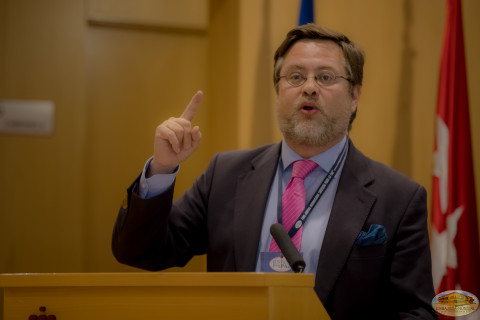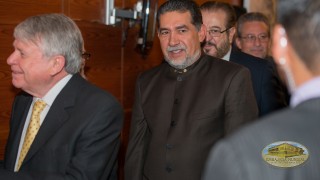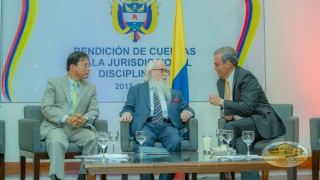Against impunity: Spain opens spaces of discussion on universal justice
Madrid was the scenario for the realization of the International Judicial Forum “New Proposals for the Prevention and Punishment of the Crime of Genocide”. The Spanish capital opened spaces of discussion on the strength, legitimacy, and efficiency of universal justice, and approaches to fight against the impunity of international crimes.
Judges and prosecutors of the International Criminal Court (ICC), magistrates of Supreme Courts, members of the judicial branch, the Attorney General's Office and the Academy from different countries, made up the group of lecturers.
The event was organized by the Global Embassy of Activists for Peace (GEAP) with the support of the Rey Juan Carlos University, held in the Communication Faculty, with the presence of professors, students, and the general public.
The thematic was centered on:
- the typification of the crime of genocide and other international crimes;
- the need of a universal justice endorsed by the Rome Statute – justice dispensed by the International Criminal Court;
- the democratization of the United Nations Organization – focused on the possibility of increasing the number of the Member States of the Permanent Security Council, and eliminate or rationalize the right to veto when dealing with preventing or counteracting the crime of genocide;
- examine the regulations of Rome Statute and the Convention for the Prevention and Punishment of the Crime of Genocide; and
- Reflections on the timeliness and scope of transitional justice as the foundation of a stable and lasting peace.
The topics are proposed by the GEAP as part of the International Program Justice for Peace, promoted by Dr. William Soto with the aim of strengthening the administration of a global justice for peace, promote the respect of human dignity, the presumption of innocence, as well as the recognition and the respect of the victims right to truth, justice, reparation, and the guarantee of non-repetition.
Silence makes us accomplices
The executive president of the GEAP, William Soto Santiago, began the lectures with the subject: “Genocides of the XXI century, its prevention, investigation, judgment, and punishment.”
Soto began by remembering crimes of history, as the Armenian genocide and the genocides of Rwanda, Cambodia and former Yugoslavia, concluding with the Jewish Holocaust or the Shoah.
“If the XX century was called the century of genocides, than the XXI century is called to be the century of peace; that is our challenge”, he stressed.
Nonetheless, he highlighted that current news show violence, a product of discrimination fueled by hate speeches and an empty education that only transmits knowledge, ignoring the formation in fundamental values and principles.
He mentioned alleged genocidal acts, such as the persecution against the Rohingya ethnicity, and other minority groups in Myanmar, the former Burma; persecution against the theistic doctrine of Falun Gong or Falun Dafa in the People’s Republic of China and other places in the world.
As well as the extermination of Christian Assyrians and Chaldeans by the Islamic State, which he assured constitutes a complete ethnic cleansing or religious purification.
Soto said that it is necessary to join forces to strengthen the legitimacy, independence, and efficiency of the ICC as a stronghold of universal justice, he also said that it is precise for society to attend the warning calls and act against the violations of human rights.
“Silence makes us accomplices of the genocidal atrocity.”
(See conference)
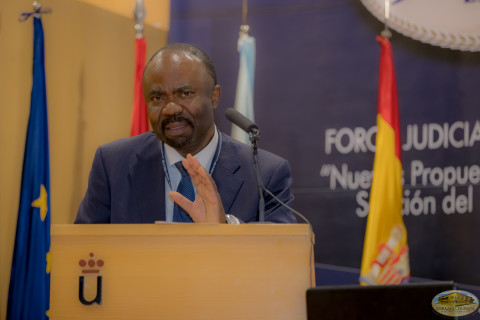 For a true universality
For a true universality
Antoine Kesia-Mbe Mindua, judge of the International Criminal Court, based his lecture on “Universal Justice for a globalized world”.
“Since human activity is already globalized and inequality is also worldwide, it is necessary to have a global justice”, he stated.
According to Mindua, universal justice must have four characteristics: it must be distributive, amended, restorative, and retributive. He also spoke on the challenges of global justice and emphasized on the economy of one of them, on how to have regulations that can prepare the world economy for everyone’s benefit. Another challenge he mentioned was the ever growing population. He said:
“We need a new way of treating ourselves, and of treating our environment, our planet, our Mother Earth.” Therefore, he assured that there is need to formalize new crimes, such as ecocide (environmental crime) and patrimonicide (economic crime).
The judge stated that the only hope for the globalized world is to have the International Criminal Court and strengthen it.
“The ICC is a great achievement in the history of mankind; but, unfortunately, the ICC and the Rome Statute are affected by what I call the schizophrenic disease, which is characterized by the existence of conflicting requirements,” he argued.
Mindua explained that the ICC is product of the Rome Statute but it is only binding to Member States, not for the world order. “There is an urgency to reach real universality.”
Commitment with International Criminal Justice
The deputy prosecutor of the International Criminal Court, James Kirkpatrick Stewart, presented a report on the measures that the prosecutor of the ICC has currently done to strengthen his efficiency.
“The purpose of effective judgment is to contribute to prevention”, said Kirkpatrick, and added that the objective, which is shared by the States and by the ICC, is to end the impunity of the perpetrators of international crimes.
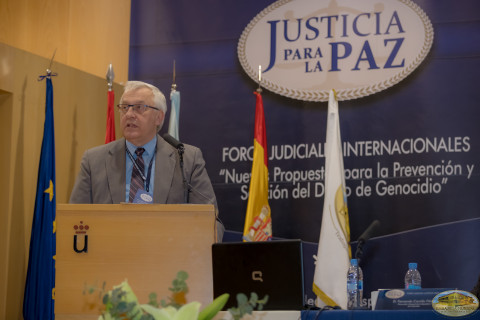
He also explained that to carry out the activities, the Prosecutor develops policies to guarantee the transparency and coherence of the job, at the same time, personnel training in function of said policies, among which he mentioned the selection and prioritization of cases.
The prosecutor revealed, among important data, that at this moment, the Prosecutor does not count with enough resources, and that the financial limitations that the Governments face have created a challenge in securing enough financing for the fulfilment of their work.
He argued that the amount of support and cooperation that the Prosecutor receives directly affects his efficiency.
“At the end, cooperation depends on the will of the Member States and others, to support the Court, and of the level of commitment with international criminal justice”, stated Kirkpatrick.
Justice knows no boundaries
Professor Santiago Castella, scholar of the European Royal Academy of Doctors, spoke of the role of the UN Security Council and the right to veto.
Castella stated that since the beginning, the creation of the Security Council was questionable, and assured that: “it continues to be a small representation of a world where peace and security can be decided by only 5 States.”
Regarding the right to veto, the scholar said that it is necessary to submit to the ICC judicial control the use of this power. He also stated that the Human Rights System needs to advance and enter the Security Council and create a universal court on human rights.
“Justice is an ethical universal criteria that knows no boundaries”.
(See conference)
Clarify the truth and repair the damage
Professor Camilo Montoya Reyes, a magistrate of the Supreme Council of the Judiciary of Colombia, spoke of transitional justice.
“A conflict is considered resolved when – apart from finding out the truth – it is necessary to repair the damage, reestablish the broken law”, he explained that that is the objective of transitional justice.
Montoya states that it is essential to establish truth as a criteria of justice and execute holistic reparation programs for the victims, which integrally repair the damage.
He added that in order to guarantee the non-repetition of mass human rights violations, transitional justice needs to go with a political substrate and a substrate of institutional reform.
(See conference)
Tool to reach world peace
“International Criminal Law and the tools of human rights protection have brought the globalization of justice.”
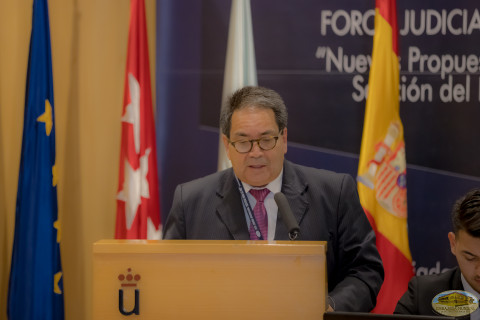
With this thought, scholar Eyder Patiño, magistrate of the Supreme Court of Justice in Colombia, based the reaches of the International Criminal Court.
Patiño mentioned that there are currently around 10 nations that are under preliminary examination of the ICC; among which he mentioned his own country for the possible crimes against humanity and of war, committed by guerrillas and paramilitary groups.
“The International Criminal Court is an important tool to reach world peace”, he stated; and argued that the opportune and just sentences will function towards general prevention, they will be crime deterrents.
Nonetheless, the magistrate indicated that the ICC requires the support of the international community; and to strengthen it, he said that it is vital to work together with the States, that the Governments effectively cooperate in the judicial, political and diplomatic area.
He also stated that it is important to examine the viability working along with NGO’s and that these make their opinions known on specific competency issues of the high court.
(See conference)
Justice for the realization of the supreme value
The general prosecutor of the Republic of Colombia, Fernando Carrillo Florez, spoke on the peace process of his country, focusing on the role of the international community and the justice system in this issue. He said:
“International jurisdiction, the Rome Statute, and the universal fight for human rights, at this very moment necessarily requires the success of our peace process in Colombia”.
Carrillo said that in order to have the validity of democracy and the rule of law they must have the guarantee of citizen rights as a fundamental element, where human dignity guides the action of the State; he assured that this was the purpose that led Colombia to the peace process.
He also mentioned that justice is an essential element for development, which assumes the validity and guarantee of fundamental rights.
He highlighted that we must work for the consolidation of justice as a value that is always oriented towards the realization of the supreme value of peace.
(See conference)
Panel: Proposals for the democratization of the UN
The Judicial Forum separated a panel for the presentation of new proposals for the democratization of the UN, which was moderated by Dr. Erika Torregrossa, Vice President of the Commission of International Criminal Justice from the Barcelona Bar, and the participants were:
- Fernando Olivan, Professor of Public Law and Constitutional Right from the Rey Juan Carlos University
- Joaquin Gimenez Garcia, Magistrate of the Supreme Court of Spain
- Jose Luis Rodriguez Villasante, director of the Study Center of International Humanitarian Law of the Spanish Red Cross.
- Franco Marcelo Fiumara, Judge of the Criminal Court – Argentina
- Tommy Calvert, Commissioner of the County of Texas – United States
The approaches for the democratization of the UN were focused on the reform and democratization of the Security Council. Among the proposals: eliminate the right to veto; admit the power of veto if two permanent members are in accord; include more permanent members in the Council and consider the regional representation with the intervention of the OAS and the African Union.
Among the proposals, the participation of Japan, Africa, and Germany in the Council as permanent members.
(See panel)

